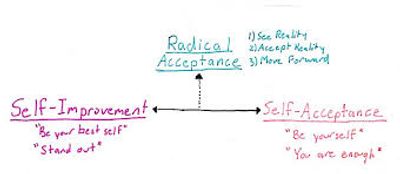RADICAL ACCEPTANCE

By Danielle Gardini, PSY. D.
“Radical acceptance rests on letting go of the illusion of control and a willingness to notice and accept things as they are right now, without judging,” Marsha Linehan
Radical Acceptance is a concept that can be difficult to internalize, yet so worth the time and effort on the journey of building a life worth living. Defined as embracing the paradox of an undesirable and intolerable situation holistically with our mind, body, and spirit. In other words, this means digging emotionally deep within oneself to come to terms with the occurrence of a painful event.
Radical acceptance represents a true dialectic; one that may seem counterintuitive, if only at first. To fully understand this concept it is important to acknowledge how acceptance is often misattributed to the approval of [something]. A factor that often arises is the belief that if we accept a painful event, we are making light of it. On the contrary, radical acceptance does not mean having approval, compassion, or passivity to an undesirable circumstance. In fact, this term speaks to the hard truth that to overcome a painful event we must accept its occurrence without needing to agree with its occurrence. It is possible [dare I say necessary] to accept the existence of pain without our consent to it. This is a true way we can successfully survive in a world of inevitable pain. Without acceptance, we indirectly allow the pain to transpire into suffering. Ultimately deeming the fate of cultivating misery, resistance, bitterness, anger, shame, & etc.
The distinction between pain and suffering is noteworthy. Pain is part of life and is experienced when a negative moment occurs. Suffering is the choice to hold onto that pain by thinking and/or acting on it even after the event has passed. Once within the suffering phase, this leads to the emotional battle against reality since it is not the way we want it to be and therefore becoming stuck. The skill of radical acceptance is valuable for accepting life as it is in this very moment, especially when living a life without ideal circumstances. The overall goal is to regain control and reduce the suffering that we end up creating. This will ultimately bring peace, contentment, and calmness.
“The path out of hell is through misery. By refusing to accept the misery that is part of climbing out of hell, you fall back into hell,” Marsha Linehan
The foundation of internalizing this skill is to accept:
(Linehan, 2015)
1) Reality as it is, even if we don’t like it
2) The future holds realistic limitations for everyone
3) Every painful event has a cause
4) Life can be worth living even with painful experiences
How to practice step by step:
(Linehan, 2015)
a) Check in with yourself and notice what you are fighting to accept the reality of something that has happened. Gently remind yourself that what has happened, has happened and cannot be changed.
b) Think about the real factors that were involved to cause this event. Consider the chain of reaction and how a series of factors cause things to occur and shape each of our lives.
c) Practice radical acceptance, focusing on aligning your whole self: thoughts, emotions, and behaviors. Be creative in using different mindfulness techniques; deep breathing, progressive muscle relaxation (PMR), visual imagery, & meditation.
d) Notice and allow the feeling of any emotions that may arise. Sitting with these painful emotions instead of avoiding is part of the healing process.
e) Use coping skills as needed such as opposite action, coping ahead, relaxation skills, or a pro/con list. Opposite action: think of the behaviors that you would engage in if you accepted the facts and then proactive engage. Your feelings with soon follow. Cope ahead: imagine and review in your mind how your life would be different if you accepted.
f) Focus on how life can be worth living even when there is pain in the world.
More Blog Posts
.webp)
Helping Children Cope with Bullying: A Therapist's Approach
.webp)
How Can I Practice Mindfulness?
.webp)
The Final Word

You can experience life again. Let’s take steps together.
At Bio Behavioral Institute, we’re here to be your team and get you back to the life you deserve. Schedule your consultation and take the first step towards a more meaningful life.
Call our office at 516-487-7116 or complete the form to schedule your consultation.
